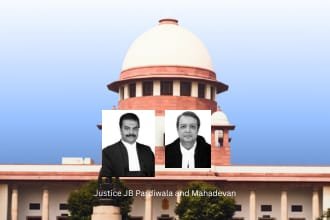The Waqf (Amendment) Act, 2025 has become the focal point of a high-stakes constitutional challenge in the Supreme Court of India, as a batch of over seventy petitions—filed by prominent political leaders, religious organizations, and civil society members—question the legality and constitutional validity of the recent amendments to the Waqf Act, 1995.
The case is currently being heard by a three-judge bench comprising Chief Justice Sanjiv Khanna, Justice Sanjay Kumar, and Justice KV Viswanathan. The hearing began on April 16, 2025, at 2 PM and is expected to extend over multiple sessions, given the volume of petitions and complex constitutional questions raised.
Who Are the Petitioners?
The petitioners include notable figures such as:
- Asaduddin Owaisi (AIMIM MP)
- Md Jawed (Congress MP)
- Manoj Kumar Jha (RJD MP)
- Mahua Moitra (TMC MP)
- TVK President & Actor Vijay
- All India Muslim Personal Law Board, Jamiat Ulema-i-Hind, Dravida Munnetra Kazhagam (DMK), Indian Union Muslim League, and several other religious and civil rights organizations.
On the opposing side, States such as Rajasthan, Gujarat, Haryana, Maharashtra, Assam, Uttarakhand, and Chhattisgarh have filed intervention applications in support of the Amendment Act, along with a caveat filed by the Central Government.
What Does the Waqf (Amendment) Act, 2025 Do?
The Amendment brings significant changes to the functioning, registration, and regulation of Waqf properties in India. Some key provisions include:
- Abolition of the “waqf by user” principle
- Time-barred restrictions for Waqf property claims
- Changes in the appointment criteria for Waqf Board members and CEOs
- Enhanced administrative powers to Collectors over waqf-related decisions
- Omission of key clauses relied upon in earlier landmark judgments like the Ayodhya verdict
These changes have triggered concerns over religious autonomy, constitutional rights under Articles 25 & 26, and the broader issue of secular governance.
Key Highlights from the Supreme Court Hearing (April 16, 2025)
1. Kapil Sibal on Limitation Periods
Senior Advocate Kapil Sibal criticized the introduction of a 2-year limitation period to claim Waqf properties, stating it could legitimize encroachments. He noted that many Waqf properties remain unregistered, and such a limitation will disproportionately impact poor and rural Muslims.
“Previously, there was no limitation. Now, if I have to do it within two years and many are unregistered, how will I claim?” – Kapil Sibal
However, CJI Sanjiv Khanna observed that the Limitation Act has its advantages and imposing time limits isn’t inherently unconstitutional.
2. “Waqf by User” Abolished – A Blow to Tradition?
Section 36 of the original Waqf Act allowed for the recognition of Waqf by long-term religious usage, even in the absence of formal deeds. This concept—”waqf by user”—has now been abolished, which Sibal argues is integral to Islamic tradition and recognized in the Ram Janmabhoomi judgment.
“Waqf by user is an integral part of religion. The Ram Janmabhoomi judgment recognized it. Now it’s abolished.” – Sibal
3. Ayodhya Judgment Basis Removed?
Senior Advocate Abhishek Manu Singhvi also argued that the Amendment effectively nullifies judicial precedents, including the 2019 Ayodhya verdict, which acknowledged the ancient Islamic tradition of Waqf.
“Section 2(r)(i) is deleted—but can you remove the basis of the judgment? That’s dangerous jurisprudence.” – Singhvi
He provocatively added, “If I see Parliament is waqf, your Lordship will not accept—but the concept is not bad.”
4. Religious Character of Waqf Challenged
Senior Advocate Rajeev Dhavan, echoing Sibal’s arguments, stated that Waqf and its charitable functions are integral to Islam, and any intrusion into their management violates constitutional protections under Articles 25-28.
He also highlighted the dilution of religious identity in the governance structure, saying:
“Earlier, the CEO had to be a Muslim. That’s no longer a requirement under the new law.”
5. Collector’s Role & Judicial Review
Another contentious point was the enhanced power of District Collectors in resolving disputes related to Waqf property under Section 7(A). Sibal expressed concern over the lack of clarity on whether such decisions could be challenged in court.
Solicitor General Tushar Mehta, appearing for the Centre, insisted that judicial review is available. However, petitioners argued that the provision is vague and prone to misuse.
Constitutional Questions Involved
The Supreme Court is likely to consider several constitutional issues:
- Does the Amendment violate Articles 25 and 26 by interfering in religious affairs?
- Does the removal of “Waqf by user” infringe upon the freedom to practice and propagate religion?
- Is the delegation of powers to administrative officers (like Collectors) unconstitutional?
- Can the Parliament retrospectively undo judicial interpretations by deleting statutory provisions?
Political & Religious Backdrop
This litigation also holds political significance, as it brings together Muslim MPs from across party lines, religious bodies, and even leaders from other communities—like a Sikh petitioner arguing that the Act violates India’s secular fabric.
This united front indicates a rare moment of interfaith constitutional solidarity.
What Lies Ahead?
The case is far from over. With dozens of petitioners, multiple states involved, and the Union of India defending the law, the Supreme Court will likely hear detailed arguments on constitutional interpretation, religious freedom, and property rights over the coming weeks.
Given the significance, the judgment in this case could have a profound impact on minority rights, religious autonomy, and judicial independence in statutory interpretation.
Conclusion
The Waqf (Amendment) Act 2025 has ignited a pivotal constitutional debate in the Supreme Court. With leading lawyers like Kapil Sibal, Singhvi, and Dhavan representing petitioners, and the Central Government standing firm, the outcome of this case could redefine the relationship between law, religion, and the State in contemporary India.


